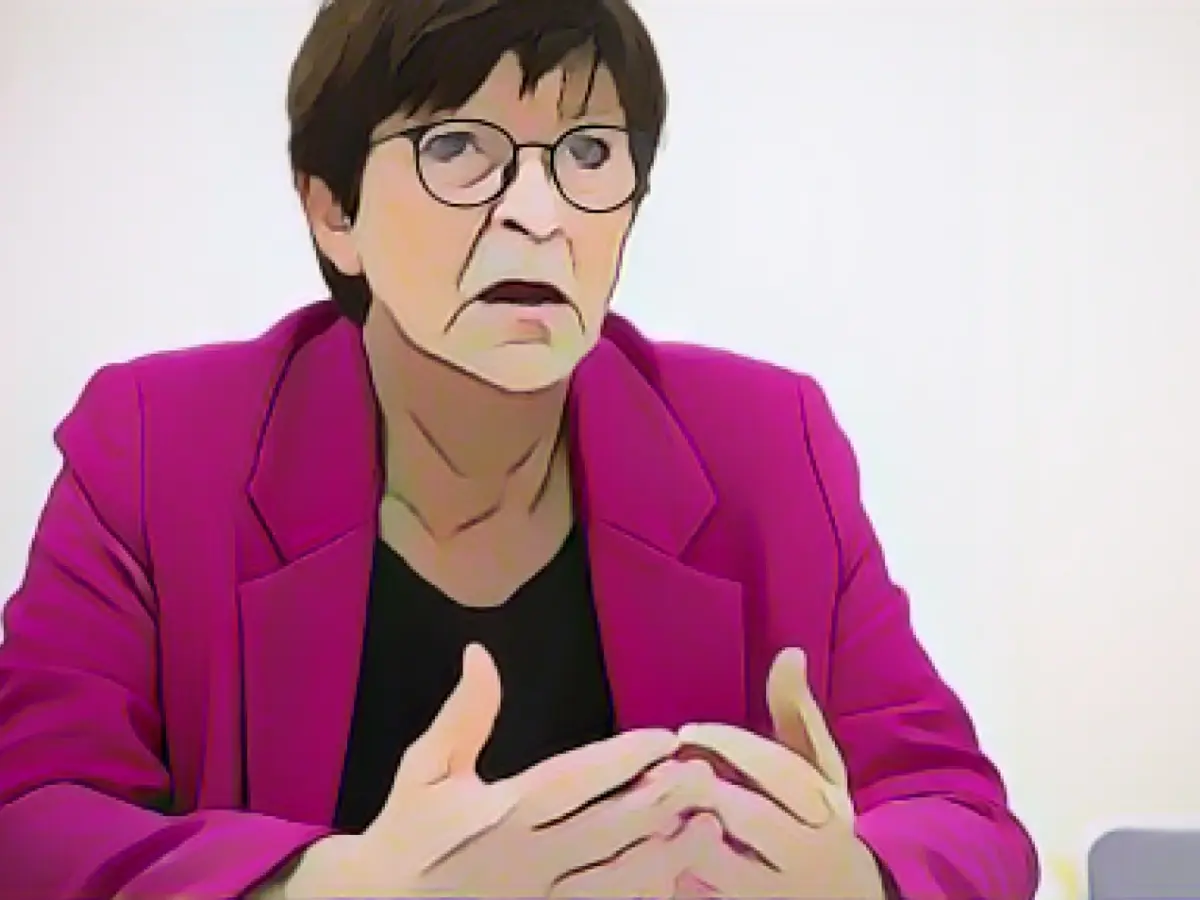Parties - SPD leader Esken: AfD ban must be examined further
Regardless of the AfD 's electoral success, banning the party remains an option for SPD leader Saskia Esken. "Such a party ban is rightly subject to high hurdles. But I am convinced that we should keep looking into it," Esken told the German Press Agency. "It is important that we talk about banning the AfD and that voters are shaken up."
SPD leader calls AfD "clearly anti-democratic"
Esken explained that the AfD is part of an extreme right-wing network, maintains lists of critical journalists who are not popular and sets up reporting portals for teachers who express criticism of the AfD. "It uses every topic to incite people. For me, that is clearly anti-democratic," emphasized Esken. "The AfD mocks democracy and the rule of law and wants to destroy them."
Esken first brought up the idea of banning the AfD before the Federal Constitutional Court back in August. According to the Basic Law, a party can be banned if it actively and militantly opposes the free democratic basic order. An application for a ban can be filed in Karlsruhe by the Bundestag, Bundesrat or Federal Government.
Esken emphasized that it is the responsibility of the offices for the protection of the constitution to constantly re-examine the threat to democracy posed by the AfD. If they come to the conclusion "that a party as a whole must be considered right-wing extremist, then the sword of prohibition must be drawn". The AfD is currently classified as "definitely right-wing extremist" by the state offices for the protection of the constitution in Saxony, Thuringia and Saxony-Anhalt.
Esken: "The current polls are a warning to us"
The AfD recently made significant gains in state elections in western Germany and won mayoral and mayor elections in eastern Germany. In all polls for the Bundestag elections, the party is in second place behind the CDU/CSU with more than 20 percent, well ahead of all three governing parties SPD, Greens and FDP.
Esken warned of the consequences of further electoral successes for the AfD this year. "The current polls are a warning to us," she said. "We will make it clear in the coming months that our country is at risk of great damage if the AfD gains political power. Because that would be a major rupture and a major threat to democratic culture, our common good and our business location."
Elections will be held in three eastern German states in September: Saxony, Thuringia and Brandenburg. In all three states, the AfD is leading the polls, in some cases by a considerable margin. It is not ruled out that it could win an absolute majority of parliamentary seats in at least one of the states and appoint a prime minister.
Read also:
- Year of climate records: extreme is the new normal
- Precautionary arrests show Islamist terror threat
- UN vote urges Israel to ceasefire
- SPD rules out budget resolution before the end of the year
- Despite the AfD's electoral success in various regions, Saskia Esken, the SPD leader, underscores the necessity of further examining the possibility of banning the party.
- Esken clarifies that the AfD, due to its connections with extreme right-wing networks and its suppression of critics, can be considered as clearly anti-democratic.
- The inception of the idea to ban the AfD was introduced by Esken before the Federal Constitutional Court in August, based on the stipulations of the Basic Law.
- The offices for the protection of the constitution in Saxony, Thuringia, and Saxony-Anhalt classify the AfD as "definitely right-wing extremist," which may trigger prohibition proceedings against the party.
- As detailed by Esken, it is crucial for the offices for the protection of the constitution to continuously evaluate the threat posed by the AfD to democracy.
- Drawing from the current polling trends, Esken warns of the potential consequences should the AfD attain further electoral successes, asserting it could significantly affect Germany's democracy and economic growth.
- In the upcoming September elections in Saxony, Thuringia, and Brandenburg, the AfD is leading the polls in all three states, raising concerns about its potential to garner an absolute majority and infiltrate the political landscape.
Source: www.stern.de








